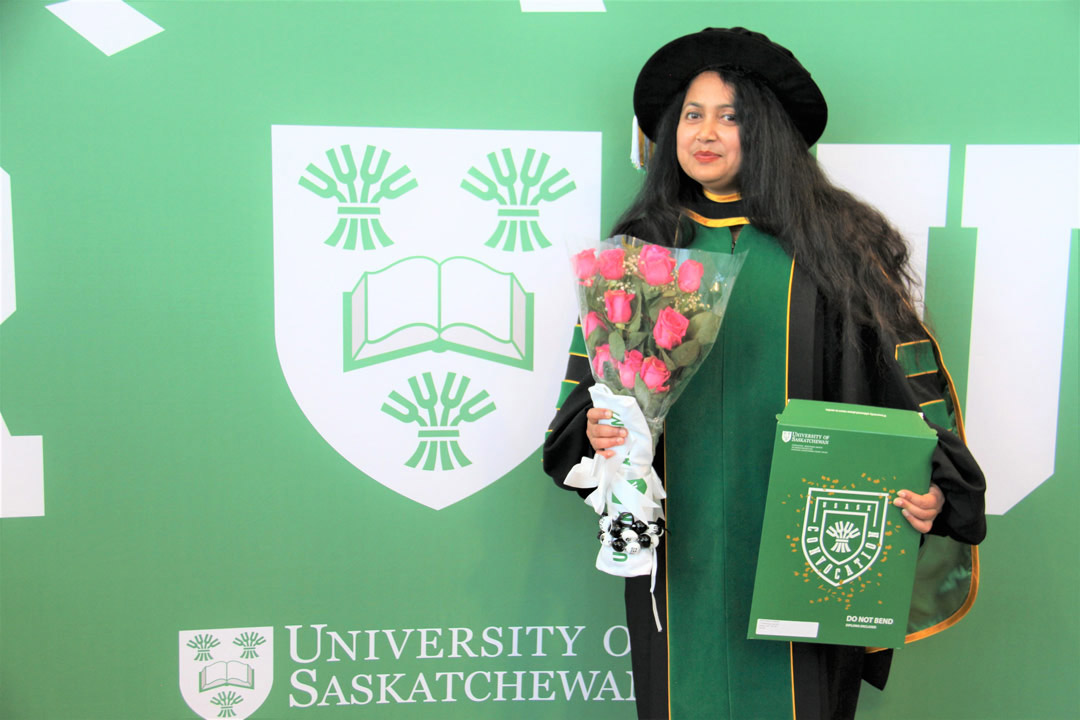
A new Canadian finds empowerment through Indigenous learning, relationships
Indigenous knowledge helped USask graduate Dr. Jebunnessa Chapola (PhD) understand her own Bangladeshi upbringing
By Chris PutnamWhen Dr. Jebunnessa Chapola (PhD) arrived in Canada in 2010, she knew little about the history or worldviews of the land’s Indigenous peoples.
Twelve years later, as she receives her PhD in women’s, gender and sexualities studies from the University of Saskatchewan (USask) at 2022 Fall Convocation, that knowledge has changed her life.
“I feel like we have only one job now: to protect this land,” said Chapola.
Chapola grew up in Bangladesh, where she completed her first degree in sociology. At age 23, she moved abroad to study social work in Sweden, then gender and development in Norway, before immigrating with her husband to Canada.
Chapola left her home country to seek social justice. As a young woman in Bangladesh, she lacked decision-making power and routinely faced threats of harassment and sexual assault.
“I never felt safe in my workplace, in public transportation, or even in my classroom,” she said.
When Chapola, a Muslim, married her Hindu husband, Dr. Ranjan Datta (PhD), she became the target of religious racism for the first time. The couple realized that their interfaith marriage would never be accepted in Bangladesh, and even when they arrived in Canada, they were not accepted by most of the Bangladeshi-Canadian community.
Despite her anger at these injustices, Chapola felt she lacked the knowledge and the tools to express her anger or ask critical questions about religion, patriarchy and colonialism.
That began to change when she came to Saskatoon.
“I grew up in a colonial land with a colonial history. But though my major was in sociology and women and gender studies back home, I never—in Bangladesh, Norway, Sweden, and the U.S., in my entire academic journey—I didn’t receive decolonial education. The University of Saskatchewan campus gave me that opportunity,” she said.
Through her studies at USask and through volunteer work in the community, Chapola came to understand Canada’s colonial history and the ongoing effects of racism against Indigenous people in this country. She was outraged by what she learned.
“Then I started to connect with my own history. I realized that in Bangladesh, India, Pakistan, those South Asian countries, we also have a similar colonial history, but usually we do not call it a colonial history.”
Chapola now saw that many of the injustices and prejudices that had shaped her life were legacies of South Asia’s patriarchal and colonial histories. She found freedom in the holistic worldviews of the Indigenous people of Canada.
“This holistic approach, it really made me understand my positionality here in this stolen land. It helped me to understand and to deconstruct myself and to decolonize my entire upbringing in Bangladesh,” Chapola said.
Her transformative journey is the subject of her USask PhD dissertation submitted in August.
Chapola, who recently began roles as a post-doctoral fellow at the Johnson Shoyama Graduate School of Public Policy and a sessional lecturer at Mount Royal University, believes that learning Indigenous colonial histories is the responsibility of everyone in Canada, including newcomers. She says it is further essential to understand the Indigenous meaning of land.
“What I have learned from Indigenous scholars here in North America is that land is my body. I have to take care of the land the same way I have to respect and take care of my body, because our language, our history, culture—all are originated from that. So if we learn to respect the land, then gender justice will be achieved. Then Indigenous rights will be achieved. Then racial justice will be achieved.”
Much of Chapola’s education happened outside of classrooms. For nine years, she was one of the lead organizers of a community garden at USask mainly used by international students living in residence. She also hosted a radio show on CFCR for eight years.
Chapola viewed these projects as community learning opportunities. At the garden, she organized antiracist workshops and cross-cultural potlucks, while her radio show regularly invited Indigenous Elders, scholars and activists as guests.
Dr. Marie Lovrod (PhD), associate professor in the College of Arts and Science and Chapola’s PhD supervisor, said that Chapola’s work in the community is one of the things that made her an exceptional student, along with her “dauntless commitment to critical decolonizing feminist research” from a newcomer’s perspective.
“Jebunnessa’s deep investment in community engagement demonstrates her faith that such networks can be a vital resource in building bridges between immigrant and Indigenous worldviews. She clearly means to leave every environment she inhabits better than she found it,” Lovrod said.
Chapola believes some of the harms of settler colonialism can be healed when marginalized communities work together to share and create knowledge.
“My learning journey was not my journey only,” she said. “Because whatever I have learned, I have learned it together, collaboratively, with my community members.”

